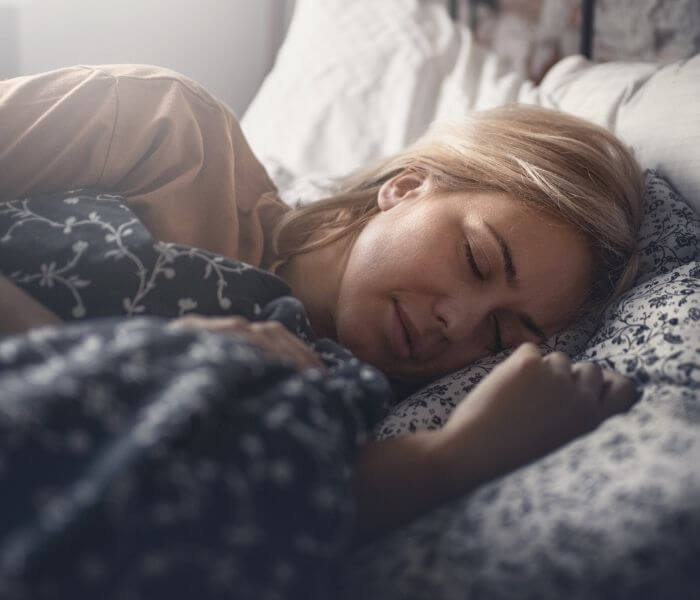
- Understanding the Importance of Sleep
- The Stages of Sleep
- The Benefits of Quality Sleep
- 8 Tips for Improving Your Sleep
- 2. Optimising Bedroom Temperature and Lighting
- 3. Reducing Noise and Distractions
- 4. Set a Regular Sleep Schedule
- 5. Creating a Relaxing Bedtime Ritual
- 6. Managing Naps and Sleep Debt
- 7. Diet and Nutrition in Sleep
- 8. Exercise and Their Impact on Sleep Quality
Are you struggling to get a good night’s sleep? You’re not alone. According to studies, around one-third of the world’s population regularly experience difficulty sleeping. Fortunately, there are many ways you can improve your sleep quality, from understanding the science behind sleep to embracing healthy lifestyle habits. In this article, we’ll explore proven strategies to help you achieve better sleep.
You can read more about the importance of sleep in our article ‘Why is Sleep So Important to Our Health?’, but in this article, we take a look at the top causes of poor sleep and what you can do to improve your sleep quality.

Understanding the Importance of Sleep
Sleep is essential for our health and well-being. It helps our body repair and rejuvenate itself, regulate mood and emotions, and consolidate memories. While we sleep, our brain forms new neural connections, and our body releases hormones that regulate important bodily functions like appetite, metabolism, and growth. However, the importance of sleep goes beyond these basic functions.
A good night’s sleep can make all the difference in how we feel and perform the next day. It can affect our productivity, creativity, and ability to make decisions. It can also impact our relationships with others, as lack of sleep can make us irritable and moody.
The Stages of Sleep
When we sleep, our brain goes through several different stages, each with its unique characteristics. In the first stage, we transition from wakefulness to sleep. Our muscles begin to relax, and our heart rate and breathing slow down. In the next stage, we enter a deeper sleep, during which our body temperature drops, and our brain waves become slower. In the final stage, we experience REM (Rapid Eye Movement) sleep, characterised by rapid eye movements, vivid dreams, and increased brain activity. REM sleep is crucial for memory consolidation and emotional processing[1].
The amount of time we spend in each stage of sleep can vary depending on factors like age, lifestyle, and overall health.
The Benefits of Quality Sleep
Getting quality sleep is essential for our physical and mental health. It helps reduce the risk of chronic conditions like obesity, diabetes, heart disease, and depression. It also boosts our immune system, improves cognitive function, and enhances our mood and well-being. In fact, studies have shown that people who get enough quality sleep are more likely to live longer and have a better quality of life[2].
Quality sleep can also benefit our appearance. During sleep, our body produces collagen, a protein that helps keep our skin looking youthful and healthy[3]. Lack of sleep, on the other hand, can cause dark circles under our eyes, dry skin, and even acne.
8 Tips for Improving Your Sleep
1. Choosing the Right Mattress and Pillows
Did you know that the average person spends about one-third of their life sleeping? That’s why it’s essential to invest in a comfortable and supportive mattress and pillows that will ensure you get a good night’s sleep.
When choosing a mattress, consider factors like firmness, materials, and size. A good mattress should be firm enough to support your body while also providing enough cushioning to relieve pressure points. Similarly, your pillows should be comfortable and supportive, keeping your head and neck in a neutral position to prevent pain and discomfort.
2. Optimising Bedroom Temperature and Lighting
The ideal sleep environment is cool, dark, and quiet. Blackout curtains or eye masks can block out any unwanted light. Additionally, consider the colour of your bedroom walls and decor. Soft, muted colours like blues, greens, and greys can create a calming atmosphere that promotes relaxation and sleep.
Did you know that the temperature of your bedroom can also affect the quality of your sleep? According to sleep experts, the ideal temperature for sleep is between 15 and 20 degrees celsius (60-68 Fahrenheit). This temperature range helps your body to cool down, which is necessary for falling asleep and staying asleep.
3. Reducing Noise and Distractions
Noisy surroundings and distractions can disrupt your sleep. Use earplugs or earmuffs to block out noise or use a white noise machine to drown out disturbing sounds. Consider removing any electronics from your bedroom, including televisions, computers, and smartphones, as the blue light emitted from these devices can interfere with your body’s natural sleep-wake cycle.
Creating a peaceful sleep environment is essential for getting a good night’s sleep. By following these tips, you can create a sleep-friendly environment that promotes relaxation and restful sleep.
4. Set a Regular Sleep Schedule
One of the most important things you can do to develop a consistent sleep routine is to set a regular sleep schedule. Going to bed and waking up at the same time every day helps your body establish a healthy sleeping pattern. Even on weekends and holidays, try to maintain your regular sleep schedule to avoid disrupting your body’s natural rhythm.
5. Creating a Relaxing Bedtime Ritual
Developing a calming and relaxing bedtime routine can help you wind down before sleep. This can include reading a book, taking a warm bath, or doing some gentle stretches. Avoiding stimulating activities such as watching TV or using electronic devices before bedtime can also help you relax and fall asleep more easily.
Alcohol and caffeine can disrupt sleep, so it’s best to avoid these before bedtime.
6. Managing Naps and Sleep Debt
Avoiding long daytime naps is crucial for maintaining a consistent sleep routine. Long naps can disrupt your night-time sleep schedule, leading to sleep deprivation and fatigue.
However, short power naps (up to 20 minutes) can help boost alertness and overall performance. If you feel tired during the day, taking a short nap can help you recharge and stay focused.
Gradually decreasing your sleep debt is also important for developing a consistent sleep routine. Getting enough sleep every day and not relying on the weekends to catch up on lost sleep can help ensure that you maintain a healthy sleep schedule.
7. Diet and Nutrition in Sleep
What you eat and drink can influence your sleep quality. Minimise your intake of caffeine, alcohol, and nicotine, and eat foods rich in tryptophan or melatonin, such as almonds, bananas, and tart cherries.
It is essential to maintain a healthy and balanced diet to ensure that your body is receiving all the necessary nutrients it needs to function correctly. Eating a diet rich in fruits, vegetables, whole grains, and lean proteins can help you achieve optimal health and improve your sleep quality.
Staying hydrated by drinking plenty of water throughout the day can also benefit your sleep quality. Dehydration can lead to discomfort, which can make it difficult to fall asleep and stay asleep throughout the night.
8. Exercise and Their Impact on Sleep Quality
Exercise is an essential component of a healthy lifestyle and can have a significant impact on your sleep quality. Regular physical activity can help reduce stress and anxiety, which are common causes of sleep problems. It can also help regulate your body’s natural sleep-wake cycle, making it easier to fall asleep and stay asleep throughout the night.
However, exercising too close to bedtime can have the opposite effect and make it more difficult to fall asleep. It’s best to schedule your workouts earlier in the day to give your body time to wind down before bedtime.
- Health scores calculated
Close
This information has been medically written by Dr Thom Phillips
Thom works in NHS general practice and has a decade of experience working in both male and female elite sport. He has a background in exercise physiology and has published research into fatigue biomarkers.

Dr Thom Phillips
Head of Clinical Services
Related articles
Like this article? Here are some more based on similar topics.





